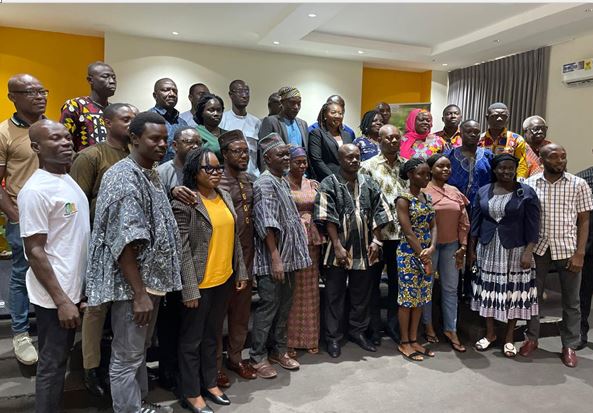By Mohammed AWAL ([email protected])
The Peasant Farmers Association of Ghana (PFAG) has called for a forensic audit of expenditures under the first phase of government’s flagship Planting for Food and Jobs programme.
Speaking at a national stakeholder validation workshop on the programme’s second phase, acting Executive Director-PFAG Bismark Owusu Nortey noted that while billions of cedis have been allocated to the Ministry of Food and Agriculture, very little assistance has trickled down to farmers on the ground.
Describing implementation of the programme’s first phase as a “catastrophic failure”, he said the PFAG “will pursue and push for a forensic audit because we believe that under phase-one of the Planting for Fod and Jobs programme a lot of things went under the radar which were not accounted for”.
It is estimated that government has spent GH¢2.9billion on the flagship agricultural programme since its introduction in 2017, as of September 2023.
A breakdown of expenditure on the programme earlier reported by the Business and Financial Times (B&FT) showed that government spent GH¢400million in 2018, GH¢380million in 2019 and some GH¢400million in 2020. Additionally, GH¢439million was spent on the programme in 2021, GH¢614million in 2022 and GH¢660million in 2023.
Despite the huge sums spent, the sector’s growth rate has remained painfully low at around 0.7 percent – with the country battling rising food inflation not seen in decades, bemoaned the Executive Director of PFAG.
“I recall that in 2017, when government introduced the Planting for Food and Jobs, almost all farmers were in complete ecstasy. We were happy. We were thrilled that there was an intervention that was going to provide support for farmers, at least in the form of subsidy. However, we all know how the PFJ turned out. I summarise and say that the PFJ-1 was quite a catastrophic failure,” he stated.
Most smallholder farmers were therefore happy when government rebranded and relaunched the programme as PFJ 2.0. But delays in rolling out the second phase of the country’s flagship flagship agriculture intervention is threatening to severely impact food security.
According to the association’s president, Weipa Addo Awal Adugwala, farmer registration under PFJ Phase 2 is still ongoing despite it being the peak of the rainy season, with some districts registering only 10-20 percent of farmers so far.
“This could force farmers to buy expensive farm supplies from open markets, thus reducing planted areas. With 40% food inflation already, lower production from untimely inputs may push prices up over 50% and worsen access to affordable food,” he said.
He’s therefore calling on government to speed up registration through deploying more personnel or piloting the programme in select areas. “Any disruption to input distribution risks hurting yields, farmers’ incomes and overall domestic food supply,” he stated.
The National Validation
The national validation workshop for an assessment report on implementation of the Planting for Food and Jobs Programme Phase II (PFJ 2.0) held in Accra was organised by PFAG in collaboration with the Ministry of Food and Agriculture (MoFA) and Deutsche Gesellschaft für Internationale Zusammenarbeit (GIZ).
PFJ 2.0 was launched by the Ministry of Food and Agriculture (MOFA) in response to challenges encountered during the programme’s initial phase. These challenges included limited access to agricultural credit, insufficient adoption of the value chain approach, budgetary constraints on government and low prioritisation of national food storage capacity.
Furthermore, issues such as smuggling, rent-seeking and corruption were highlighted by PFAG’s annual assessment reports, leading to significant calls for a review of the programme.










